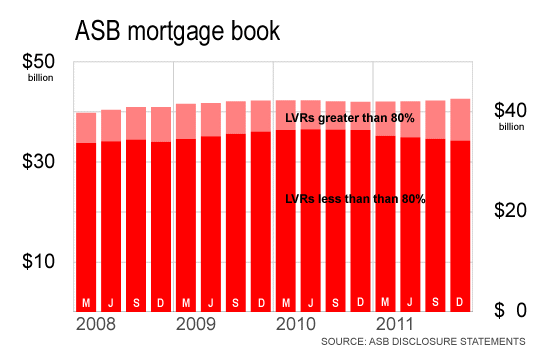
By Gareth Vaughan
ASB's strong growth in home loans with loan-to-valuation (LVR) ratios above 80.1% - and above 90% - continued unabated in the December quarter, rising a combined NZ$667 million to reach 19.5% of the bank's NZ$42.584 billion residential mortgage book.
This rise to NZ$8.3 billion worth of home loans with LVRs above 80% at December 31, 2011 is up NZ$667 million from NZ$7.6 billion, or 18.1%, just three months earlier at September 30, according to ASB's latest General Disclosure Statement (GDS). ASB's home loans comprise 81% of the bank's total NZ$52.5 billion worth of loans to customers.
The Reserve Bank has required banks to disclose their LVRs on residential mortgages since March 2008. At that point ASB had NZ$6 billion, or 15%, of its NZ$39.8 billion worth of home loans at LVRs above 80%.
Although some of the major banks wouldn't write home loans with LVRs above 80% at the height of the global financial crisis, they certainly have been over the past year or so. Analysis by interest.co.nz shows a NZ$2.9 billion rise in residential mortgages held by the big five banks with LVRs above 90% to NZ$14.2 billion in the year to September 30 last year. Aside from ASB, the biggest growth came from BNZ and Westpac.
Loans with LVRs above 90% growing fastest
Of ASB's December quarter growth, the bulk came through home loans with LVRs above 90%. This segment grew by NZ$490 million in the quarter to NZ$3.923 billion, outstripping NZ$177 million growth in home loans with LVRs between 80.1% and 90% to NZ$4.386 billion. At March 31, 2008 ASB had NZ$1.5 billion worth of home loans with LVRs above 90%.
ASB's home loans in all the other LVR categories disclosed - 0% to 60%, 60.1% to 70%, and 70.1% to 80% all fell in the December quarter. The bank's overall mortgage book, based on the LVR disclosures, rose by NZ$366 million.
When ASB released its half-year financial results earlier this month, showing a record net profit after tax of NZ$372 million, CEO Barbara Chapman told interest.co.nz the high LVR residential mortgage lending involved some very high quality customers, but was something ASB watched closely.
"It is an area of the market where there are some very high quality customers, particularly that first home buyers market, so we’ve got offers in place now and customers definitely are coming to us for that kind of business," Chapman said then.
"I’m comfortable with where it is, we keep a really close eye on it as you can imagine."
Auckland house values at record levels
The growth in ASB's high LVR loans comes with government owned property valuer Quotable Value (QV) saying this month house values in Auckland, where ASB - formerly the Auckland Savings Bank - is heavily exposed, rose 2.1% in the past three months and 5.1% over the past year. Auckland values are above the previous market peak, set in late 2007, by 1.9%. QV says Auckland house values are rising faster than any of the other main centres. As of June 30 last year, 55% of ASB's total credit exposures were in Auckland.
ASB's latest GDS also notes the bank paid parent Commonwealth Bank of Australia an ordinary dividend of NZ$160 million, or 7.12 cents per share, on February 22. No dividend was paid last February although ASB paid an NZ$80 million dividend, equivalent to 4c a share, in the six months to December 2010.
The GDS also shows ASB's December quarter net profit after tax up NZ$62 million, or 47%, to NZ$195 million from NZ$133 million the same period of 2010. The profit growth came as total operating income rose 10%, operating expenses fell 5% and impairments on loans fell to just NZ$4 million from NZ$37 million. The bank grew deposits from customers in the quarter by NZ$1.7 billion to NZ$39.3 billion.
This article was first published in our email for paid subscribers this morning. See here for more details and to subscribe.
13 Comments
Housing bubbles can deflate slowly, just look at Japan. This one is primarily a function of loose credit. The bubble will start deflating again if credit limits tighten (and I personally think an LVR>80% is crazy), the cost of borrowing increases, or we go into recession.
I have looked at Japan, and they had a fantastic bubble that puts NZ to shame. At one point just the land under the Emperial Palace had the same value as all the land in California. These guys didn't dick around when it came to having a bubble, then went all in long, 100 year mortgages. Stocks at 100 PE, what could possibly go wrong. Compared to the US, Japan has done bugger all stimulus untill very recently.
Here is a chart, that is how a bubble should look.
Yes, it would be interesting if someone smarter than me like Gareth could value the depreciation of a house given the reduced interest costs.
Alot of people say interest rates on morgage have dropped 50% so you can buy twice the house for the same money but ofcourse if the average sale price of property stays the same while interest rates have dropped 50% then logically house prices have fallen 50% and our dollar is worth 50% less.
The value of gold Vrs property would probably confirm this.
Interesting that since mid 2010 till now the 80% and under LVR mortgages have been steadily declining; and looks like the banks are simply getting despirate and ramping up the 80% and over LVR mortgages to make up the difference.
Pretty clear that if they maintaind the strict 80% and under LVRs only then we would of seen pretty steep drops in property prices since 2010.
Ofcourse as the trend continues they will get to a point where they simply can not keep ramping up the 80% and over mortgages to make up for the short fall, then prices will fall again.
Roadhouse,Stumbled across this from wiki: "According to Goldman's figures, a one-percentage-point rise in mortgage rates would reduce the fair value of home prices by 8%.[citation needed]"
So dropping 2% in mortgage rates should of given house prices an instant 16% gain, they actually fell around 15% in real terms, adjusted/normalised for big drop in interest rates closer to 30% fall.
So Banks are like NASCAR and F1 drivers......
They drive at the very edge, and the chanpions drive on that edge.
And our banks are doing the same....80% fine, 66% is acceptable normal driving around a race circuit.
Is this sensible or responsable or even stable behavour for our mainstream banks?
Can they afford to hit the barrier?
Can they walk away when they do?
Can they afford to rebuild the 'racecar' for the next meet?
And if they cant, what happens to the country the people...the government?
My understanding is that governments are there to protect, ensure good practices are carried out....from dealling with illegal parking to armed robbery, good fire arms use and economic stabilty......
Come on, guys
Auckland, our biggest and ballsiest market has increased 1.9% since 2007? It's in a major correction as we speak. The ocean liner has slowed far more quickly than the non-discretionary cost of living. The 'house as cash register' is empty; the 'don't worry we'll borrow our way back to growth' has failed; the cash-in public assets to pay a minute portion of the interest on our failed policies' is well under way. Leadership has run out of viagra. When drug companies start reducing the price of a stiffy you just know confidence is drooping.


We welcome your comments below. If you are not already registered, please register to comment.
Remember we welcome robust, respectful and insightful debate. We don't welcome abusive or defamatory comments and will de-register those repeatedly making such comments. Our current comment policy is here.